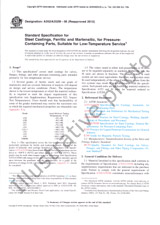We need your consent to use the individual data so that you can see information about your interests, among other things. Click "OK" to give your consent.
ASTM D2591-07(2020)
Standard Test Method for Linear Density of Elastomeric Yarns (Short Length Specimens)
Translate name
STANDARD published on 1.2.2020
The information about the standard:
Designation standards: ASTM D2591-07(2020)
Publication date standards: 1.2.2020
SKU: NS-983421
The number of pages: 5
Approximate weight : 15 g (0.03 lbs)
Country: American technical standard
Category: Technical standards ASTM
The category - similar standards:
Annotation of standard text ASTM D2591-07(2020) :
Keywords:
elastomeric yarn, linear density,, ICS Number Code 59.080.20 (Yarns)
Additional information
| Significance and Use | ||||||||
|
5.1 This test method is considered satisfactory for acceptance testing of commercial shipments because current estimates of between-laboratory precision are acceptable and the method is used extensively in the trade for acceptance testing. 5.1.1 If there are differences of practical significance between reported test results for two laboratories (or more), comparative tests should be performed to determine if there is a statistical bias between them, using competent statistical assistance. As a minimum, use samples for such comparative tests that are as homogeneous as possible, drawn from the same lot of material as the samples that resulted in disparate results during initial testing, and randomly assigned in equal numbers to each laboratory. The test results from the laboratories involved should be compared using a statistical test for unpaired data, at a probability level chosen prior to the testing series. If bias is found, either its cause must be found and corrected, or future test results for that material must be adjusted in consideration of the known bias. 5.2 Linear density of elastomeric yarns is used in some calculations for tensile and elastic properties. 5.3 The test method is based on elastomeric yarns in lthe “as-produced” condition, but may be used for treated elastomeric yarns provided the treatment is specified. The method does not cover the removal of finish for the determination of linear density of “finish-free” elastomeric yarns. |
||||||||
| 1. Scope | ||||||||
|
1.1 This test method covers the determination of the linear density of short lengths of “as produced” elastomeric yarns made from rubber, spandex or other elastomers. Note 1: For the determination of linear density of elastomeric
yarns using skeins, refer to Test Method D6717.
1.2 This test method is not applicable to covered, wrapped, or core-spun yarns, or yarns spun from elastomeric staple, or elastomeric yarns removed from fabrics. 1.3 This test method is applicable to elastomeric yarns having a range of 40 to 3200 dtex (36 to 2900 denier). 1.4 The values stated in either SI units or U.S. Customary units are to be regarded separately as standard. Within the test the US Customary units are in parentheses. The values stated in each system are not exact equivalents; therefore, each system shall be used independently of the other. 1.5 This standard does not purport to address all of the safety concerns, if any, associated with its use. It is the responsibility of the user of this standard to establish appropriate safety, health, and environmental practices and determine the applicability of regulatory limitations prior to use. 1.6 This international standard was developed in accordance with internationally recognized principles on standardization established in the Decision on Principles for the Development of International Standards, Guides and Recommendations issued by the World Trade Organization Technical Barriers to Trade (TBT) Committee. |
||||||||
| 2. Referenced Documents | ||||||||
|
We recommend:
Technical standards updating
Do you want to make sure you use only the valid technical standards?
We can offer you a solution which will provide you a monthly overview concerning the updating of standards which you use.
Would you like to know more? Look at this page.




 Cookies
Cookies
